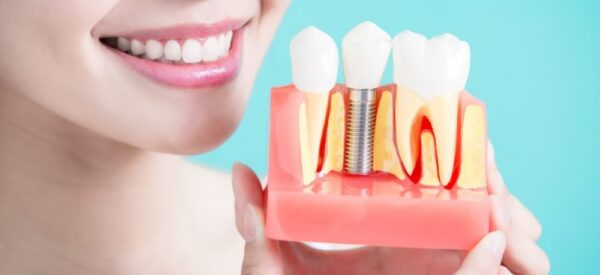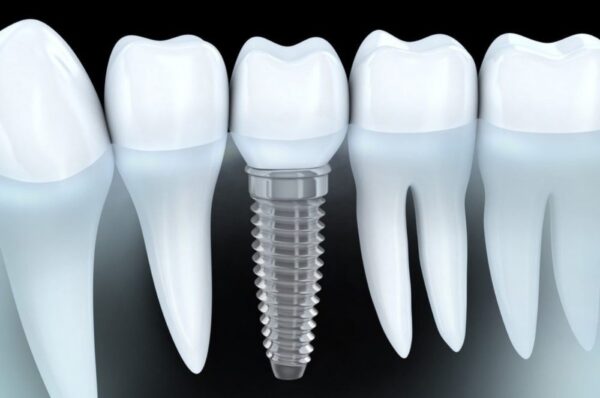“How long do dental implants last?” is a common question among individuals considering dental implants. Maintaining the longevity of dental implants is crucial to enjoy their benefits for years to come. Dental implants are known for their durability and reliability, but proper care and adherence to certain guidelines are essential to ensure their extended lifespan.
From practicing good oral hygiene to scheduling regular check-ups, understanding how to safeguard your dental implants can make all the difference in preserving their functionality and aesthetics. In this post, we’ll explore valuable tips and guidelines that empower individuals to maximize the lifespan of their dental implants, ensuring a confident and healthy smile for the long term.
Average lifespan of dental implants
The average lifespan of dental implants can vary based on a multitude of factors, including the patient’s oral health, overall health, oral hygiene practices, lifestyle habits, and the quality of the implant materials used. In general, dental implants have a high success rate and can last for decades, often exceeding 20 years or more.
With proper care and maintenance, many patients can expect their dental implants to remain functional and aesthetically pleasing for a long time. Regular dental check-ups, diligent oral hygiene routines, and avoiding habits like smoking can contribute to prolonging the lifespan of dental implants.
It’s important to note that individual experiences may vary. Some patients may enjoy their implants for a lifetime, while others might experience complications that necessitate repairs or replacements sooner. Consulting with a qualified dental professional and following their guidance on care and maintenance will greatly influence the lifespan of dental implants in each individual case.

Factors affecting the lifespan of dental implants
“How long do dental implants last” is a common question, and the lifespan of dental implants can be influenced by various factors that impact their stability, functionality, and overall longevity. These factors include:
- Oral Hygiene: Proper oral hygiene practices, such as regular brushing, flossing, and using antimicrobial mouthwash, prevent plaque buildup and reduce the risk of gum disease, which can compromise implant health.
- Health and Lifestyle: General health conditions, including diabetes and autoimmune disorders, can impact healing and implant integration. Lifestyle factors like smoking can hinder healing and increase the risk of implant failure.
- Bone Density and Quality: Adequate bone density and quality are crucial for implant stability. Patients with compromised bone structure may require additional treatments, like bone grafts, to improve implant success.
- Implant Placement: Precise implant placement is essential for optimal load distribution and long-term success. Improper placement can lead to mechanical stress on the implant, affecting its durability.
- Implant Materials: High-quality implant materials, such as medical-grade titanium, contribute to the implant’s durability and compatibility with the body.
- Bite Forces: Excessive or uneven bite forces can place stress on implants and supporting structures, potentially leading to implant failure over time.
- Regular Dental Check-ups: Routine dental visits allow professionals to monitor implant health, identify issues early, and provide necessary interventions to prevent complications.
- Maintenance and Cleanings: Professional cleanings by dental hygienists help maintain gum health around implants, reducing the risk of infection and inflammation.
- Occlusion (Bite Alignment): Proper alignment of the teeth and implants in the bite is crucial to avoid undue stress on the implants.
- Age: While dental implants are suitable for various age groups, the longevity of implants can be influenced by the patient’s age and bone health.
- Medications: Certain medications or treatments can impact bone health and healing, affecting the success of dental implants.
- Bruxism (Teeth Grinding): Bruxism can exert excessive force on implants and surrounding structures, potentially leading to implant complications.
- Follow Post-Operative Instructions: Adhering to post-operative care instructions provided by the dental professional ensures proper healing and reduces the risk of complications.
- Proper Treatment Planning: Thorough evaluation and treatment planning by experienced professionals ensure that patients receive appropriate implant solutions tailored to their unique needs.
Understanding these factors and working closely with a qualified dental professional to address them can significantly contribute to the longevity and success of dental implants.

How to maintain your Dental Implants?
Maintaining your dental implants involves a combination of proper oral hygiene practices, regular professional care, and lifestyle choices. Here’s a comprehensive guide on how to effectively care for and extend the lifespan of your dental implants:
- Brush Regularly: Brush your teeth and implants at least twice a day using a soft-bristle toothbrush. Use a fluoride toothpaste and brush gently around the implant area to prevent plaque buildup.
- Floss Daily: Flossing is crucial to clean between teeth and implants. Use floss or interdental brushes designed for implants to remove debris and bacteria from hard-to-reach areas.
- Use Antibacterial Mouthwash: Rinse with an antimicrobial mouthwash to reduce bacteria and maintain gum health around the implants.
- Avoid Smoking: Smoking can negatively impact implant healing and increase the risk of complications. Quitting smoking enhances implant success and overall oral health.
- Healthy Diet: Consume a balanced diet rich in vitamins and minerals to support gum and bone health. Avoid excessive sugar and acidic foods that can contribute to plaque formation.
- Limit Alcohol and Sugary Beverages: Limit alcohol consumption and sugary drinks, as they can contribute to oral health issues.
- Protect Against Bruxism: If you have a habit of teeth grinding (bruxism), use a night guard to prevent excessive pressure on the implants while you sleep.
- Regular Dental Check-ups: Visit your dentist every six months for professional cleanings and check-ups. Dental professionals can monitor the health of your implants and address any issues promptly.
- X-rays and Imaging: Follow your dentist’s recommendations for regular X-rays and imaging to monitor the condition of your implants and bone health.
- Inform Your Dentist: Always inform your dentist about your implants before any dental procedure. This helps them take proper precautions to avoid damaging the implants.
- Avoid Hard Foods: Avoid chewing on hard objects, ice, or extremely tough foods that could put stress on the implants.
- Stay Hydrated: Drinking water helps maintain oral health by washing away food particles and promoting saliva production, which has antibacterial properties.
- Manage Medical Conditions: Control systemic conditions like diabetes and autoimmune disorders, as they can impact healing and implant success.
- Follow Post-Op Care: Adhere to post-operative instructions given by your dental professional after implant surgery to ensure proper healing.
- Educate Yourself: Stay informed about dental implant care and maintenance by consulting your dentist and following their advice.
By consistently following these guidelines and maintaining a partnership with your dental care provider, you can significantly enhance the lifespan and overall health of your dental implants.

Conclusion
In conclusion, the care and maintenance of dental implants are vital for ensuring their longevity and continued effectiveness. By practicing diligent oral hygiene, attending regular professional check-ups, making healthy lifestyle choices, and following personalized recommendations from dental professionals, individuals can preserve the functionality and aesthetics of their dental implants for years to come. With these efforts, dental implants can provide a confident and healthy smile that stands the test of time.
Consult a reputable dental implant location in VietNam: Dental implant in downtown hcm



